Results
-
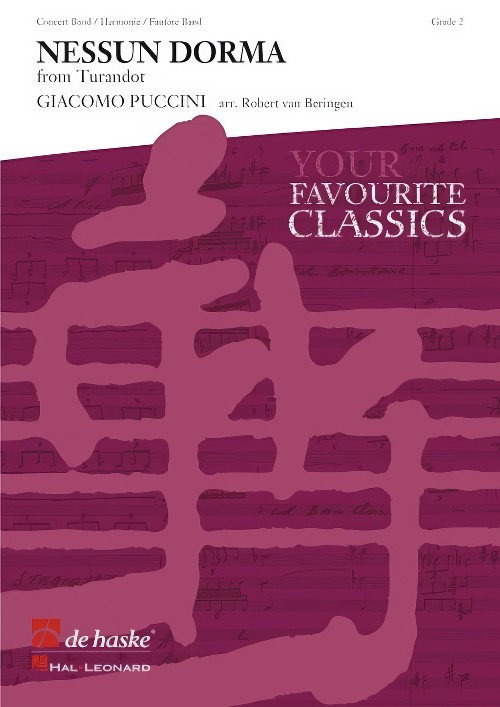 £84.99
£84.99Nessun Dorma (Concert Band - Score and Parts) - Puccini, Giacomo - Beringen, Robert van
Nessun Dorma, an aria from Puccini's Turandot, is now instantly recognised due mainly to the performance by the late Pavarotti at the 1990 World Cup in Italy. Since that time its popularity has continued to grow and it is now often thought of as Pavarotti's theme tune.This version for concert band retains all the intense feeling of the original.Duration: 3:00
Estimated dispatch 7-14 working days
-
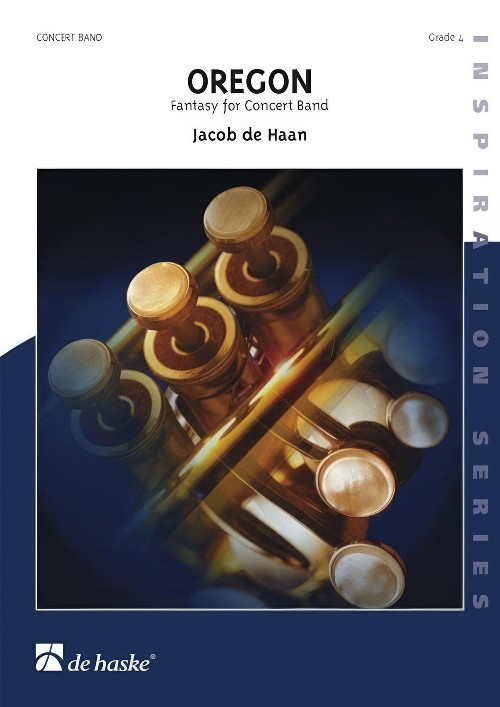 £137.99
£137.99Oregon (Concert Band - Score and Parts) - De Haan, Jacob
This fantasy tells the story of Oregon, one of America's north-western states. Traveling by train on the Northern Pacific Railroad, the listener is taken through the fascinating Oregon landscape. Indians, cowboys, golddiggers and hooded wagons will file past on this adventurous journey. The piece has some similarities with a soundtrack of a movie. Various melodies, which could be the main themes of a movie, pass the review.The piece begins in a slow movement, introducing the first theme in minor. Then we hear in the following fast movement the trombones imitate the train, whistling the steam-flute. We hear the characteristic minor theme again, but now in different variants (also in major). The rythmic structure of "western" stile and rock succeed each other. This is leading to the slow movement, where the signals of horns and trumpets introduce a wonderful vocal melody. After this characteristic melody, the fast movement appears shortly again, the trombones whistling the steam-flute again (now in major). We hear also some musical elements, that plays a part in the following Presto. Barchanges, jazzy chords, interesting rhytmic patterns (with bongo) and an original theme are the characteristics of this Presto. After this, the horns announce the last section of the piece. Interesting is the fact that we hear in this Allegro section a variant of the vocal melody in the slow movement. Also the Presto theme returns shortly, followed by the Allargando, which is a grand characteristic end of a soundtrack. The movie of our travelling fantasy has come to an end.Duration: 9:00
Estimated dispatch 7-14 working days
-
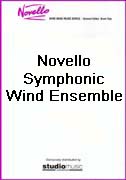 £164.95
£164.95CATENA (Novello Symphonic) - Keuris, Tristan
Refrains and Variations for 31 wind instruments and percussion. Catena, Latin for chain, is a work of enormous range; passages of power and fire alternating with sections of the utmost tranquillity and lyricism: now pungent, now wistful. The broad outline is a set of twelve variations interspersed with ritornelli and passaggi, framed by a prelude and postlude and with a concluding coda. Duration: 14 mins.
Estimated dispatch 7-14 working days
-
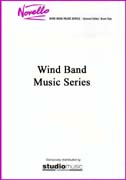 £32.95
£32.95CATENA (Novello Symphonic) Extra Score - Keuris, Tristan
Extra Score only. Refrains and Variations for 31 wind instruments and percussion. Catena, latin for chain, is a work of enormous range; passages of power and fire alternating with sections of the utmost tranquillity and lyricism: now pungent, now wistful. The broad outline is a set of twelve variations interspersed with ritornelli and passaggi, framed by a prelude and postlude and with a concluding coda. Duration: 14 mins.
Estimated dispatch 7-14 working days
-
 £134.99
£134.99Marche au Supplice Wind Band Set (Score & Parts)
Hector Berlioz (1803-1869) once remarked: "My life is a novel that greatly interests me." Experiences in his personal life had a great influence on his compositions. Symphonie Fantastique, written in 1830, is also autobiographical: he subtitled the work Episode in the Life of an Artist. The symphony echoes his feelings for an actress. The Marche au Supplice (march into torture) he described as: "The artist dreams he has killed his beloved, that he has been sentenced to death and is being led to the scaffold. The procession moves to the notes of a march that is now sombre and turbulent, now radiant and stately, and in which boisterous outbursts suddenly dissolve into the heavy sound of marching feet." 0:04:50
Estimated dispatch 7-14 working days
-
 £174.99
£174.99Two Symphonic Interludes Wind Band Set (Score & Parts)
Based on the poems by German poet Carl Hauptmann (late Romanticism) and the English poet William Wordsworth (early Romanticism). Carl Hauptmann was in poor health as a child, but highly intelligent. He studied philosophy, psychology and biology. In the latter he was admitted to the degree of doctor. His marriage provided financial independence, so that he could focus on his studies. Hauptmann wrote various novels, plays, poetry and scientific works. Night Twilight floats above the valley's night mists are hanging, there's a whispering brook. Now the covering veil is lifting quite: come and look! See the magic land before our gaze: tall as dreams the silver mountains stand, crossed by silent silver paths shining from a secret land. Noble, pure, the dreaming country sleeps. By the path the shadow black and hogh of a beach. a wisp of a white smoke creeps to the dark'ning sky. Where the valley is the darkest hued countless little lights shine silently. O my soul! Drink of solitude! Carl Hauptmann Wordsworth 'introduced' a new type of poetry, based on the speech of the common man. This was his answer to the poetry of the classicism which was bound by rigid rules. His definition of poetry was: the spontaneous overflow of powerful feelings from emotions recollected in tranquility. My heart leaps up when I behold a rainbow in the sky My heart leaps up when I behold A rainbow in the sky: So was it when my life began. So is it now I am a man. So be it when I shall grow old, Or let me die! The Child is father of the Man. And I could wish my days to be Bound each to each by natural piety. William Wordsworth In a truly poetic manner Harrie Janssen has transformed the contemplative thoughts of the poets into two compositions for Concert Band. 10:45
Estimated dispatch 7-14 working days
-
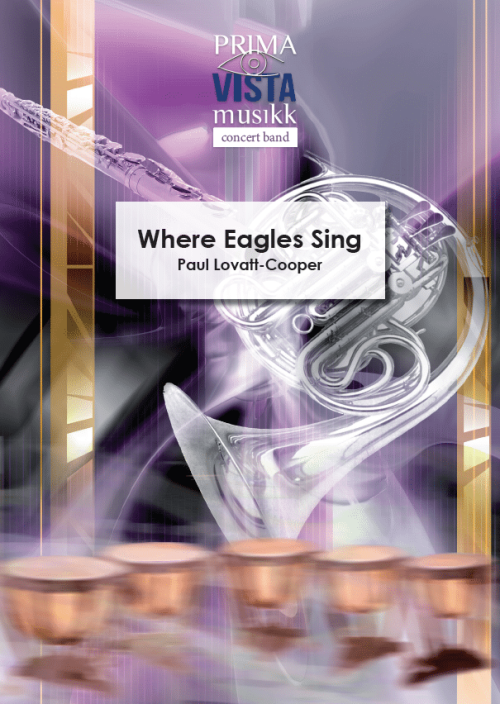 £59.95
£59.95Where Eagles Sing (Concert Band - Score and Parts) - Lovatt-Cooper, Paul
The inspiration for this piece came when the composer visited Florida and the Bird Sanctuary in Walt Disney World's Animal Kingdom. He was in the audience to see the rare bird show where he witnessed some fabulous looking and endangered birds that were trained to perform different tricks that wowed the audience. The highlight for him was the conclusion of the show where the most awesome sight greeted us as an American Bald Eagle soared over the audience. That particular breed of Eagle has been a very rare bird of late. With so few in numbers, it nearly became a member of the sad group of animals that are extinct.The host of the show took great delight in informing the audience that the fantastic creature is now officially safe and no longer classed as endangered. This made a great impact on the composer as the Eagle is an amazing bird, huge in size and power and yet so graceful in flight. This piece is everything associated with the Eagle; bold, powerful and graceful and now free to soar and sing in the American homelands.Where Eagles Sing has been hugely successful as a curtain-raiser (or finale) with brass bands around the world and it is hoped that this version for concert band will be just as popular.Duration: 4.00
Estimated dispatch 7-14 working days
-
 £73.50
£73.50Kyiv, 2022 - Brian Balmages
Now in ColorFlex format for groups with limited instrumentation! Kyiv, 2022 was written as a powerful sequel to Moscow, 1941, one of Brian Balmages's most well-known pieces. This work changes the narrative, where the theme from Moscow now becomes the aggressor, and the heroic people of Ukraine are represented by the Ukrainian National Anthem and the powerful "Prayer for Ukraine." Certain to spark discussions about humanity, history, and culture. (4:30)About ColorFlexConductors no longer need to choose between function and texture! Ensembles with instrumentation challenges still have numerous options to cover all parts, yet orchestration is elevated significantly to be faithful to the composer's original intent. Musicians have more opportunities to rest, and timbre once again becomes a central element of each work. So go ahead and have the best of both worlds: flexible and colorful.
Estimated dispatch 7-14 working days
-
 £123.95
£123.95Bagatelles for Band - Vincent Persichetti
Since its premiere on May 21, 1961 by the Dartmouth College Band (composer conducting), Bagetelles for Band has become a fixture on state contest and festival repertoire lists. We are pleased to produce a new printing, now including the condensed score as well as a standard 9" x 12" full score. Additionally, a large (11" x 14") conductor score is now available.
Estimated dispatch 7-14 working days
-
£76.99
Nessun Dorma - Giacomo Puccini
Nessun Dorma, an aria from Puccini's Turandot, is now instantlyrecognised due mainly to the performance by the late Pavarotti at the1990 World Cup in Italy. Since that time its popularity has continuedto grow and it is now often thought of as Pavarotti's theme tune.This version for concert band retains all the intense feeling of theoriginal.
Estimated dispatch 7-14 working days
